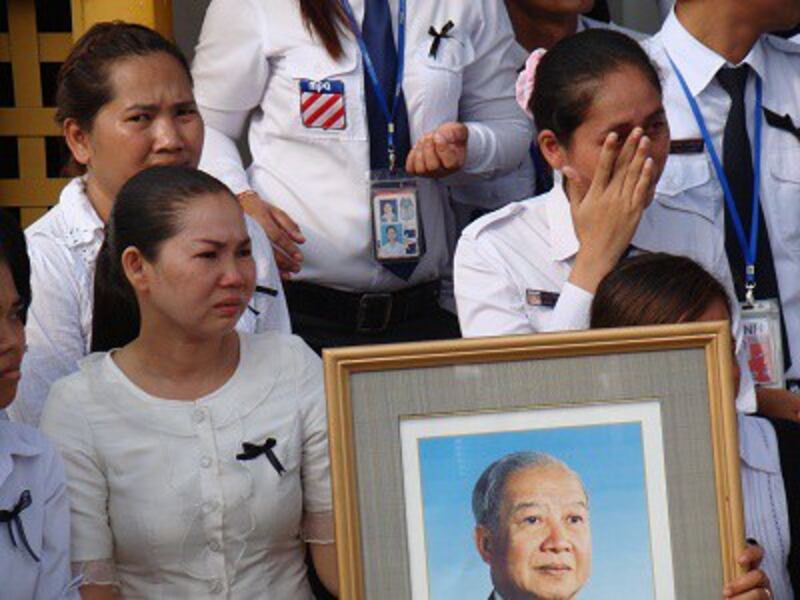Crowds of mourners lined the streets of Phnom Penh on Wednesday to pay their respects as the body of Cambodia’s former king Norodom Sihanouk was flown home from China.
The flight carrying the body of the ex-monarch, who died of a heart attack in Beijing on Monday, arrived at the Phnom Penh International Airport at 2:50 p.m., marking the start of a week of national mourning.
Also on the plane were Sihanouk’s widow Queen Mother Monineath, his son and successor King Sihamoni, and Cambodia Prime Minister Hun Sen who traveled to collect the body from China, where Sihanouk had lived while undergoing treatment for cancer.
At the airport, 90 monks chanted prayers in a traditional ceremony for Sihanouk before his golden casket was loaded on a float and taken in a convoy to the Royal Palace, where it will lie in state for three months.
Over 100,000 mourners, many of them dressed in white, lined the procession route along the 8 kilometer (5 mile) airport road to pay their respects to Sihanouk, who had led Cambodia through the eras of French colonialism, Japanese rule during World War II, and the Vietnam War.
One villager who joined mourners in the funeral procession at the airport said Sihanouk had left overwhelming achievements for generations of Cambodians after him.
“He took the throne when he was just 10 years old, helping to build the country since he was young, and did a lot for the country,” he said.
A woman at a separate procession in northern Cambodia’s Siem Reap Province, where 5,000 people marched to pay their condolences at the royal family’s second residence, said she would gladly sacrifice her life for the king.
“I love the former king, and I would sacrifice some of the length of my life for him if only he could be alive again,” she said.

Royal legacy
Sihanouk, known since his abdication in 2004 as the King-Father, is a revered figured in Cambodia, where many elderly people recall the period of his rule in the 1950s and 1960s as a golden era.
Government spokesman and Minister of Information Khieu Kanharith praised the king as a leader who had guided Cambodia through its independence in 1953 and transition to a modern country.
“The retired king is the symbol of our national unity and reconciliation,” he said, adding that he knew the king would want Cambodians to “stay united.”
Yim Sovann, a spokesman for the opposition Sam Rainsy Party, said Cambodia had lost a unifying figure who had been important to the country’s national reconciliation following the bloody Khmer Rouge regime.
“The former king is the father of our national independence and unity,” he said.
Sihanouk’s legacy was tainted because he linked up with the notorious Khmer Rouge to regain political influence. He allied with the communist Khmer Rouge in the 1970s but became a voiceless prisoner in his own palace until a Vietnamese invasion removed the regime from power in 1979 and he returned to exile.
The former king was known for his often lavish lifestyle, which included a love of film, jazz, cars, food, and women. He married at least five times—though some say he had six wives—and fathered 14 children. But despite his life of excess, he was beloved throughout Cambodia.
A monk at the ceremony in Siem Reap said the whole country was grieving his loss.
“It is the same as losing a very precious thing. We are very sad. People are impressed by the former king’s achievements. He fought for the country’s independence,” he said.
National mourning
The public will be allowed to pay their respects to Sihanouk at the Royal Palace in Phnom Penh, before his body is cremated according to Buddhist ritual after three months.
During the week of national mourning, which will last until Oct. 23, the Cambodian flag will fly at half staff and radio and television stations may not broadcast lighthearted programming, the government announced.
Prime Minister Hun Sen has also issued a directive cancelling boat racing in front of the Royal Palace during the month-long national Water Festival, set to begin next week, that attracts millions of visitors to Phnom Penh every year.
But races in other locations will go forward and the three-day national holiday will remain in place.
Reported by RFA’s Khmer service. Translated by Samean Yun. Written in English by Rachel Vandenbrink.
